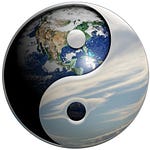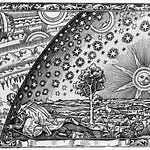Rigpa is Dzogchen’s word roughly equivalent to “enlightenment.”
But what is rigpa, actually? And what does it imply for ethics?
A conversation with .
This is a clip from the monthly Q&A I host for Evolving Ground, a community for contemporary Vajrayana practice.
Participation in the Q&A sessions is free for Evolving Ground members, and membership in Evolving Ground is also free. Our next Vajrayana Q&A is tomorrow, Saturday April 12th, 2025!
Transcript
That’s rigpa
Varun: I’m still not sure I understand what rigpa is or why you would want it. Which is, which is like, um, yeah. Would you, would you be willing to, like, talk—
David: Oh, you look like you’re enjoying yourself? Are you enjoying yourself?
This isn’t a trick question. It’s just a straightforward one. You’ve got a big grin!
Varun: I, I’m enjoying the absurdity of the question itself. It’s like, yeah, these practices—for reasons I don’t understand, but I’m doing them anyway—towards a goal I can’t comprehend or understand! But, I guess it’s fine, and I’m doing it anyway, with a bunch of people that are cool, whose company I enjoy, for reasons I don’t know. And I don’t know, there’s like an element of absurdity that just comes to my head when I ask this question, and I can’t help but laugh at it.
David: Yeah. So that’s rigpa.
Varun: What?
David: That’s rigpa.
Varun: What?
David: So the element of absurdity and, and, and finding the humor in this situation. There’s rigpa.
Varun: Right.
I don’t know how to react to what you just said.
David: Perfect.
Varun: Right. So is this it? I’m enlightened? Is that, is that, is that what you’re saying? Is that, is that right?
David: Yeah. Everybody’s always enlightened. And rigpa’s kind of noticing that, and finding the absurdity in an ordinary situation, and enjoying that is… That can cut straight to it.
Isn’t that just nihilism?
Varun: But isn’t that— if I pull this thread too much, isn’t that just nihilism?
David: Why?
Varun: Because… I don’t know, isn’t it good to do good things?
David: Yeah, it is.
Varun: But how will I know what’s good? If it’s just all vibes, then aren’t I just like doing whatever I want, effectively?
David: Ah… right. Um,
Varun: Isn’t that—
David: This is, this is a different question! Um, If you start from the absurdity and the enjoyment, then you won’t be doing what you want. You’ll be spontaneously acting beneficially.
Varun: Yeah. So this is what I have trouble with, right? I’m acting spontaneously, but how do I know it’s actually beneficent?
David: You don’t.
Varun: But then…
David: I mean, you can never know whether what you do is going to be beneficial. I mean, one should be sensible, and sensitive, and understand basic ethical principles. And no amount of that is ever going to guarantee that what you do is not going to be harmful or hurtful.
Um, there isn’t any framework within which we can find certainty about anything, but in particular about benefit. We can develop the intention to be beneficial, which is what Bodhisattvayana is about. Bodhisattvayana is about developing that heartfelt sense of wanting everybody to be well. But that doesn’t mean that you’re actually going to be able to do anything about it. It doesn’t mean you’re never going to hurt people. You will.
Varun: I see. So rigpa isn’t really about normativity in some sense.
David: Absolutely not. Yes.
Varun: Okay. That’s really helpful.
It seems like, I think, I think what I struggle with, with rigpa, right, is: I don’t know how to square that with this idea that I want to engage in ethical behavior, but I may self-deceive myself about whether I’m being ethical or not, in various ways of the word self, like the term self-deception.
David: Mm-hmm.
Varun: And if I understand you correctly, what I’m hearing is that rigpa isn’t really about, like these Dzogchen practices aren’t really about ethics.
David: Not at all. Absolutely not at all.















Share this post